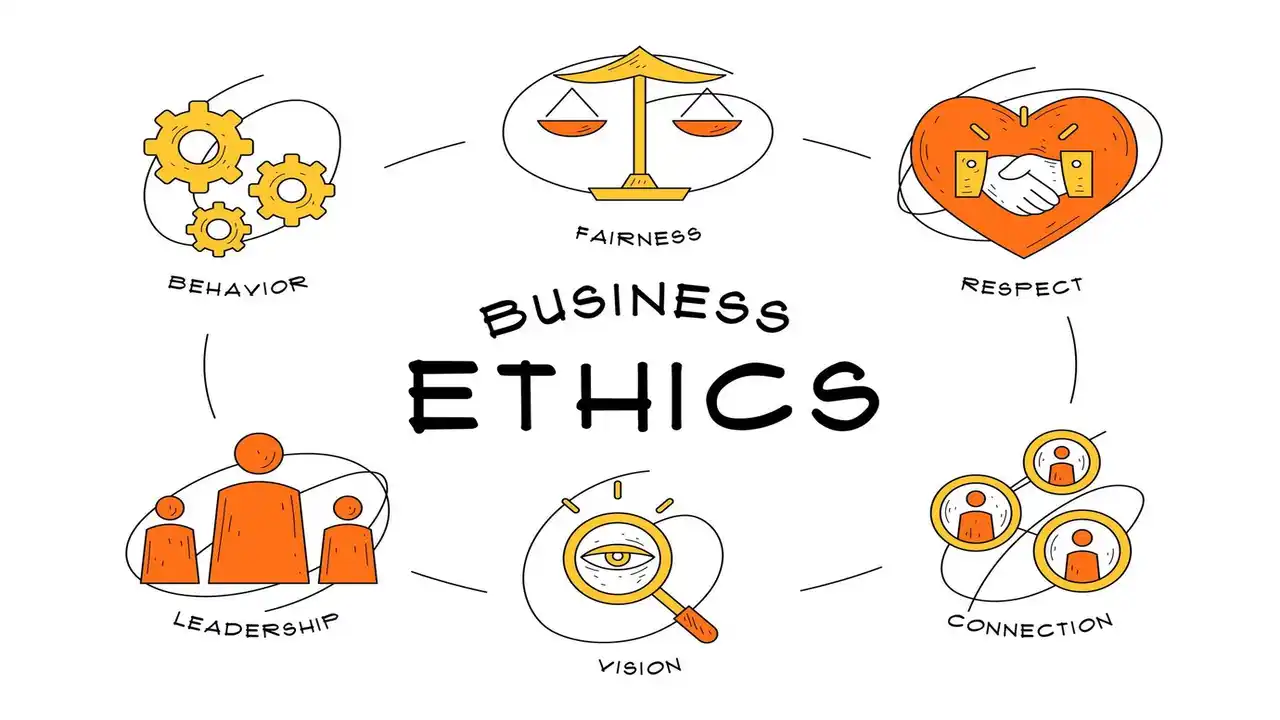Corporate ethics is the study of ethical behavior inside corporations in response to potentially contentious issues. Corporate governance, insider trading, bribery, discrimination, CSR, fiduciary obligations, and a variety of other related issues are among them. Although the law is usually the underlying concept of business ethics, there are times when firms might improve their public image by incorporating business ethics as a guiding principle. The business ethics will be covered in-depth in this article, along with some examples for your convenience. We’re going to take a look at the business ethics and discuss related matters in this topic.
Business ethics are important for a variety of reasons. The first and most important advantage is that the company will never have to worry about breaking the law and retaliating against its employees, customers, or members of the general public. If, on the other hand, management is aware of the ethical quandaries that arise during the course of doing business, the establishment will benefit even more. You should be aware of business finance along with the ethics for businesses.
Meaning of Business Ethics
“Business Ethics” refers to the application of moral principles in an organizational setting. Legislative foundations are frequently used to guide corporate ethics laws, which serve to discourage both firms and individuals from engaging in unethical acts such as bribery, insider trading, and discrimination.
Nonetheless, additional ethical norms may have an impact on employee relationships, how firms perform their social duties, and how they deal with customers and suppliers. Business ethics exists to create and enforce a code of conduct that all members of an organization, from the CEO on down, must follow. Ethical company practices ensure that every employee is valued, treated with respect, and maintains an open line of communication with one another.
The word “business ethics” refers to a set of rules and practices that govern a company’s activities. These principles regulate the organization’s behavior in all aspects of its existence, including relations with governmental authorities and other businesses, employee treatment, and the connection it cultivates with its clients. These governing principles must be invoked whenever an organization faces an ethical quandary or argument.
Business Ethics Examples
Many firms have rules in place that prohibit employees from accepting gifts from other sources, including clients, unless such presents are fully disclosed to customers. Some may include policies governing part-time employment, freelance jobs, and other flexible work arrangements. The primary goal of these policies is to protect employees’ integrity in situations when a conflict of interest can occur.
Another tenet of conducting business ethically is careful adherence to all applicable laws and regulations, such as those governing labor and employment, taxation, and employee safety. Organizations that operate in an ethical and legal manner have better reputation and integrity. More suitable applicants may apply for available opportunities when the company’s reputation as an employer improves.
How does Business Ethics Work?
Following ethical standards allows one to display trustworthiness, candor, and generosity toward others. Every day, we are surrounded by ethical standards that drive us to behaviors that benefit others and discourage us from engaging endeavors that would result in unjust outcomes.
The use of business ethics benefits the legal system because it provides acceptable behavior that is not subject to regulatory supervision. Several firms have developed codes of ethics to cultivate trust among shareholders and consumers while fostering a corporate environment that encourages integrity and honesty.
Benefits of Business Ethics
A sizable section of the populace is accustomed to reading or hearing about the positive ethical outcomes that can be obtained through corporate ethics. However, there are countless other advantages. A well-managed approach to workplace ethics has various advantages, some of which are listed below.Enforcing ethical norms at work may result in direct financial costs. Quite possible, this will necessitate considerable thought.
Paying Attention to Common Interests
The organization’s corporate morale has the power to persuade all employees that the company’s interests should take precedence over those of any other group, even their own. This is because all employees, not just those in management roles, have a vested interest in the organization’s success and play an important role in attaining its goals.
Having a Good Image in the Customers’ Eyes
A corporation can cultivate a positive image among its customers by ensuring that its staff and management follow ethical business practices. Our reputable status will instill confidence in prospective clients, increasing the likelihood that they will engage in commercial transactions with us.
Customer relationship management (CRM) software makes it possible to facilitate modern customer contacts. A CRM system’s functionality includes the obligation of managing consumer information. Order processing, customer service, and value addition are all part of this. Furthermore, data kept in a CRM system can be used to notify customers of service improvements.
Overall Benefits of Ethics Programs
Donaldson and Davis, on the other hand, ask in their essay “Business Ethics” how this will affect the bottom line. Explain how cultivating an ethical culture within an organization boosts the credibility of managerial decisions, instills trust in employees, ensures consistent product quality, and motivates employees to be more aware of the implications of the organization’s values and communications. Furthermore, this helps boost the organization’s culture by making it more balanced and unified.
Maintain a Moral Course in Turbulent Times
During moments of considerable transformation, such as the ones that for-profit and non-profit organizations are currently experiencing, it is critical to pay careful consideration to ethical norms in the business world.
When change is common, leaders frequently face complicated ethical challenges, making a crystal-clear moral compass impracticable in navigating these intricacies. Employees and managers alike can benefit from a continuing focus on ethical values in the workplace by raising their understanding of their own desired behavior.
FAQ
What are the Benefits of Good Business Ethics?
Business ethics, which establishes suitable methods that go beyond what the government may control, strengthens the law. Organizations impose codes of ethics to build a culture of trust among employees and to gain the support of key stakeholders like as investors and customers.
How can Business Ethics be Improved?
Participate actively in their job, keep them informed, and share your knowledge. Personnel, investors, regulators, and consumer communities, among others, can be effectively involved through efficient and helpful communication. Training and communication that is frequent, consistent, and efficient can help to develop an ethical culture.
Why is Ethics so Important in Life and in Business?
Ethical values should help us improve the world by guiding our activities. Maintaining high ethical standards in one’s personal life can have a positive impact on one’s work life. Business executives play a particular role and bear great responsibility for influencing the ethical behavior of their respective firms and the communities in which they operate.
Summary
“Business ethics” refers to a collection of norms or “principles” that govern organizations’ ethical behavior. This analysis looks at the interrelationships between an organization’s strategies, procedures, and goals. Organizations are required under business ethics principles to tell the truth to their stakeholders and the general public. Overcharging clients, providing subpar products or services, failing to achieve a suitable profit margin, and using inaccurate or unfair weights are all examples of unethical business practices. In this guide, we’ve explained business ethics. I hope that provided you with some useful knowledge. We hope you found this guide, in which we explained business ethics, informative and useful.





